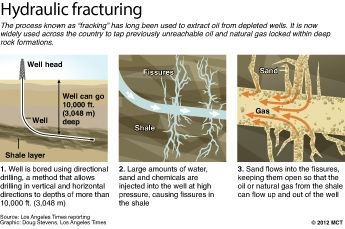Concerned Citizens of Ohio stress importance of fracking laws

Graphic diagrams how hydraulic fracturing, the controversial process known as “fracking,” is being used across the U.S. to tap previously unreachable oil and natural gas locked deep within rock formations. Graphic courtesy of MCT Campus.
The citizens of Kent urged city council to take action against companies drilling locally, but at the council meeting earlier this month, members came to no formal conclusion on the matter.
The Concerned Citizens of Ohio, a non-profit group dedicated to educating people on fracking, attended a council meeting last month to stress the importance of adopting a local law that will protect Kent residents from any potential contamination or damage drilling may induce.
The concerned citizens group doesn’t want to risk contaminating the water, said Dan Schweitzer, chairman of the Sustainability Commission, which is an organization that aims to educate citizens on environmental issues.
The group is also worried about potential earthquakes. The Environmental Protection Agency, or EPA, found that injection of fluid into wells triggered earthquakes in Ohio, Colorado, Texas, New York, New Mexico and Nebraska.
Fracking is a drilling process that involves a mixture of water and chemicals that is injected deep into the layers of ground to extract the natural gas that lies under layers of rock and water, also known as the aquifer.
Along with Pennsylvania, West Virginia and New York, Ohio has an abundant amount of natural gas trapped under the surface, known as the Marcellus Shale. There are 78,000 injection wells, or sites that have gas under the aquifer, in Ohio. The amount of natural gas under the Marcellus Shale is enough to supply the entire United States for two years, according to the Kent, Ohio website.
“Ninety-five percent of wells in Ohio are fracked, it’s not a new process,” Schweitzer said.
Members of the Sustainability Commission have extensively studied fracking for the past nine months and met with city council earlier this month to present its findings and a list of recommendations for ordinances on local fracking.
Some of those suggestions included a ban on transporting certain hazardous material within city limits and denying oil and gas leases for city-owned land.
Schweitzer discussed many scenarios and talked about different methods that can be used to extract gas.
“The potential damage and the extent of it depends on how the company and how the natural gases are being extracted,” he said.
Tom Tomastik, spokesman for Ohio Department of Natural Resource’s mineral resource management division, said the division has not received any permits to drill on Kent State University’s campus.
“A company looking to drill deals directly with the owners of the land it wants to frack,” said Tomastik.
Eric Mansfield, executive director of media relations, confirmed Tomastik’s statement and said the university has not received any proposals to drill on campus.
More on fracking here.
Contact Whitney Gibson at [email protected].


